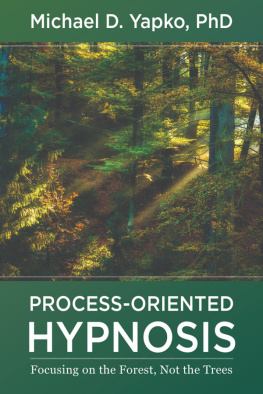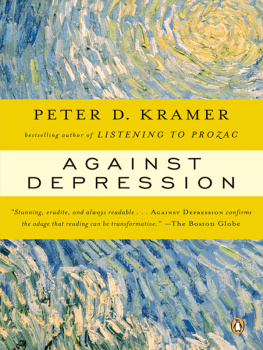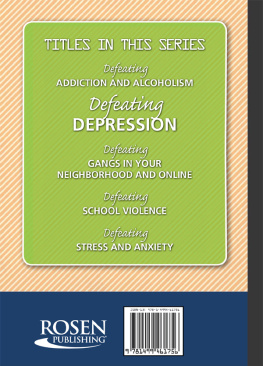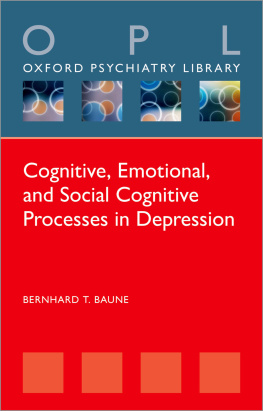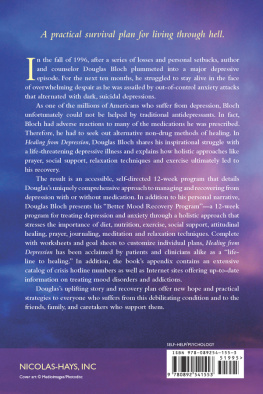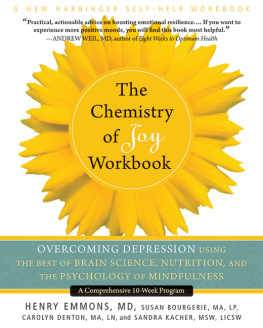
Also by Michael D. Yapko, Ph.D.
BOOKS
Hypnosis and Treating Depression:
Applications in Clinical Practice (Editor)
Trancework:
An Introduction to the Practice of Clinical Hypnosis (3rd edition)
Treating Depression with Hypnosis:
Integrating Cognitive-Behavioral and Strategic Approaches
Keys to Understanding Depression
Hand-Me-Down Blues:
How to Stop Depression from Spreading in Families
Breaking the Patterns of Depression
Essentials of Hypnosis
Suggestions of Abuse:
True and False Memories of Childhood Sexual Trauma
Hypnosis and the Treatment of Depressions:
Strategies for Change
Free Yourself from Depression
Brief Therapy Approaches to Treating Anxiety and Depression (Editor)
When Living Hurts:
Directives for Treating Depression
Hypnotic and Strategic Interventions:
Principles and Practice (Editor)
AUDIO CD PROGRAMS
Focusing on Feeling Good:
Self-Help for Depression
Calm Down! Self-Help for Anxiety
Sleeping Soundly
Managing Pain with Hypnosis
Depression Is Contagious
How the Most Common Mood Disorder
Is Spreading Around the World
and How to Stop It
Michael D. Yapko, Ph.D.

AUTHORS NOTE
The examples, anecdotes, and characters appearing in case vignettes in this book are composites drawn from my clinical work, research, and life experience. I have changed all names and other identifying characteristics throughout the book. This book is not meant to be a substitute for personal treatment, including evaluation, diagnosis, and intervention by a qualified mental health professional.

Free Press
A Division of Simon & Schuster, Inc.
1230 Avenue of the Americas
New York, NY 10020
www.SimonandSchuster.com
Copyright 2009 by Michael D. Yapko, Ph.D.
Foreword copyright 2009 by Erving Polster
All rights reserved, including the right to reproduce this book or portions thereof in any form whatsoever. For information address Free Press Subsidiary Rights Department, 1230 Avenue of the Americas, New York, NY 10020
First Free Press hardcover edition September 2009
FREE PRESS and colophon are trademarks of Simon & Schuster, Inc.
For information about special discounts for bulk purchases, please contact Simon & Schuster Special Sales at 1-866-506-1949 or business@simonandschuster.com.
The Simon & Schuster Speakers Bureau can bring authors to your live event. For more information or to book an event contact the Simon & Schuster Speakers Bureau at 1-866-248-3049 or visit our website at www.simonspeakers.com .
Manufactured in the United States of America
1 3 5 7 9 10 8 6 4 2
Library of Congress Cataloging-in-Publication Data Control No. 2008053587
ISBN: 978-1-4165-9074-3
eISBN-13: 978-1-4165-9267-9
To Diane,
whose effortless ability to light up a room
just by entering it highlights that love is contagious, too
Contents
Foreword
Familiar adages appear over and over again because they teach us simple, but important, life lessons. One of thesethe more things change, the more they stay the sameparticularly applies to the pharmaceutical revolution which has misled people to believe that pills can magically replace healthy relationships, make them happy, and cure depression. Forget about it, because thats not going to happen now or ever. Notwithstanding our modern technological society, we people are basically what we have always been. Advances made by people are advances made by people; they dont replace people.
In fact, people-to-people connectedness can outdo pharmaceuticals in treating depression. To broadcast that news, which is supported by many scientific studies, we need this powerful new book by Dr. Michael Yapko. It will be the tipping point against the present pharmaceutical domination. Dr. Yapko presents a compelling case that the popular pharmaceutical solution is overly simplistic and that we need to look to each other for the antidepressant merits of good relationships.
Dr. Yapko recognizes human relationships as key designers of psychological well-being. In clear terms, citing incontrovertible research described with no-nonsense directness, he brings our attention to the rising rates of depression, a social catastrophe in progress not just in the United States but around the world. Then, most importantly, he identifies human solutions and teaches essential skills for building positive, healthy relationships, framed to reduce the pain and isolation of depression.
The scenarios Dr. Yapko presents rarely reach the therapy office simply because most depressed people dont seek help; paralyzing helplessness and hopelessness define the disorder. But the consequences of depression undoubtedly reach into the hearts of family, friends, fellow workers, employers, customers, and others. The lives he describes are fraught with a variety of dangers, misunderstandings, faulty expectations, guilty self-appraisal, and many other common sources of malaise. But Dr. Yapko provides a professional acumen and sensible guidance with the practical exercises he has developed that give perspective and direction to all people concerned with combating depression.
The study of how relationships affect physical and mental health has a long, rich history. More than a century ago, when psychotherapy first came along, it introduced a stunningly new kind of relationship between doctor and patient. Called a transference, this special therapy relationship encompassed a lifetime of personal experience, giving it an electrifying intensity of feeling and meaning. The therapeutic effects showed more clearly than ever the impact of a well-designed relationship. This discovery was at least as captivating then as the pharmaceutical revolution is today.
Today, however, we require a larger cultural healing process, one that transforms the therapy that works for the few into a social expansion that works for the many. There is a growing awareness that no ones misery exists alone. Dr. Yapko provides extensive data that give substance to the all-important point that depression is both formed and healed in the world of people. Psychotherapists have always known this but only now have they begun to embrace the paradoxical implication: the culture that hurt their patients is also the very culture that could heal them. This dual potential effect of the cultureits toxic force and its healing antidoteis accentuated in Dr. Yapkos extensive, detailed exploration of the role of social engagements in the recovery from depression.
He also offers another paradoxical observation: Yes, we humans are biochemical organisms, as pharmaceuticals dramatize, but we are humanly biochemical. Dr. Yapko makes the case that a physical and metaphorical chemistry is created in person-to-person relationships. To think of the biochemical as only limited to a pill, as if it is external to our personhood, obscures the chemistry of human response. If you get angry with me or smile at me, you are creating a chemical synthesis that affects both you and me. Dr. Yapko makes this simple point by highlighting the latest brain research and showing that, in objectively measurable neurological terms, chemistry between people is more accurate a description than we could have ever imagined!
Next page

